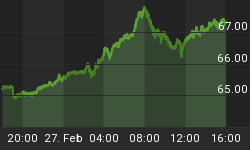Winston Churchill once said "that for a nation to tax itself into prosperity is like a man standing in a bucket and trying to lift himself up by the handle." It could be said with equal certainty that printing and spending money as a path to prosperity falls into the same category.
Unfortunately, it seems the only consistent skill governments and central banks possess is the ability to debauch their currencies. They have an unblemished track record in this regard as evidenced by the uniform collapse in the purchasing power of fiat money since modern central banking came into widespread existence in the early part of the 20th century - witness the greater than 95% decline in purchasing power in both the US and Canada as an example of massive and unrelenting central bank inflation.
Granted, pointing out the role of governments and central banks in inflation is not a novel observation. Many have made this connection before and much more elegantly including Ludwig von Mises who said "Government is the only institution that can take a valuable commodity like paper and make it worthless by applying ink" and Voltaire, a man who lived through a spectacular fiat money collapse, who said that "paper money eventually returns to its intrinsic value - zero."
So you might reasonably ask what is the point of this note if I'm going to state the obvious?
There is much talk about QE, stimulus, bond yields, risk premiums, volatility, velocity of money, deflating asset prices and so on and so on. My point today is that to focus on what is happening in the immediate term is to miss the forest for the trees. Only by taking a step back is it possible to remember that the developed world is still in the midst of a truly massive and unprecedented experiment in which the Keynesians are still in charge - printing and dispensing money on a vast scale. Some say that it will have no effect because the "velocity of money has collapsed" while others predict hyperinflation.
In the midst of all the seemingly contradictory data and the clearly contradictory predictions I prefer to fall back on a simple economic dictum - if an item can be created for zero cost and is created in increasing quantities its value will trend to zero. Is money subject to different rules than other economic goods?
That leads directly to my next question - will the governments of the west continue to print money? Morgan Stanley thinks yes. In a recently published research piece proclaiming the US "broke" and that no conceivable combination of austerity and/or tax increases will fix the problem, Morgan predicted that some form of default via the printing press is sure to happen. Societe Generale went a step further and conducted a simple calculation of the approximate "net worth" of various western governments. To use SocGen's circumspect language "the fiscal challenges are unprecedented". More specifically SocGen concluded that Italy, Germany, France, Portugal, United States, United Kingdom, Spain, Ireland and Greece all have large negative net worths - i.e. they are bankrupt. Canada wasn't mentioned, not because the government's finances aren't in the same dismal condition, but because SocGen didn't publish the numbers.
It is the unfolding bankruptcy of western governments that will drive inflation as they increasingly rely on the printing presses to fund their deficits. Jordan Roy-Byrne reminds us "Hyperinflation is a fiscal not a monetary phenomenon. The reality is that hyperinflation is first and foremost set in motion and driven by a deteriorating fiscal situation. In fact, significant economic weakness and deflation is a precursor to hyperinflation. Too many analysts believe that there has to be some economic demand or some consumption to stimulate inflation or hyperinflation. Printing money to try and stimulate your economy or excessive credit growth is what leads to inflation. Printing money because you are broke and can't service your debts is what leads to hyperinflation."
To follow the logic to it's conclusion, if the governments of the west are bankrupt isn't a printing press default plausible? Time will tell, but I feel certain about this - the governments of the world can't print food and can't print energy but they can and will continue to print money. Therefore I want to leave you with three simple questions - in the next decade will:
- Fiat money be worth more or less
- Energy demand be higher or lower
- Food demand be higher or lower
If you believe as I do that fiat money will be worth less while food and energy demand will be significantly higher then perhaps you will appreciate the logic of having long term, low cost exposure to the things that the growing economies of the world need (food and energy) but located in politically stable parts of the world like western Canada.















